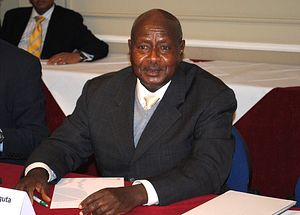While East Asian investment in Africa, particularly from China, is nothing new, Western influence in the political and social realms has traditionally been the dominant outside influence. However, Ugandan President Yoweri Museveni’s passage of an anti-gay bill reveals a changing relationship with Africa’s foreign backers, as well as a careful consideration by Museveni of the leverage he holds over Western donors. Uganda has been steadily turning toward China, which is becoming Uganda’s preferred trade and investment partner. Despite the large amount of humanitarian aid that still comes from the West, predominately the U.S., the pillars of Uganda’s economy are its growing relationship with the East.
The U.S. and its allies are indeed seriously reevaluating their aid to Uganda. The U.S. ambassador to Uganda estimates American annual humanitarian aid to Uganda to be $720 million, and Secretary of State John Kerry said that could be cut in the wake of the new anti-gay law. Denmark says $10 million intended for the Ugandan government will be diverted to NGOs for the same reason. Norway is taking a similar route with its $9 million in funds. Sweden is reconsidering its $10 million in aid, as is the Netherland with its $10.5 million government subsidy.
China has long had a policy of not interfering in the internal politics of countries with which it has trade and investment relationships. Its main goal is political and social stability, which allows for safe economic exchange and resource extraction. China has in particular made a point of not pressuring governments on social issues. It sees itself as unfairly judged by the West on issues as wide ranging as political freedom, corporate espionage, the environment, and its restive ethnic enclaves of Tibet and Xinjiang. In that sense, China has created an atmosphere of solidarity with countries like Uganda against perceived “social imperialism.”
Chinese investment in Uganda is significant. In September 2013 China National Offshore Oil Corporation (CNOOC) for $2 billion won the right to develop Uganda’s Kingfisher field, which holds an estimated 196 million barrels of recoverable oil. The Chinese have also invested $3.7 billion in infrastructure to link Rwanda, Uganda and Kenya with a rail line for export through Mombasa. China is also financing 85 percent of two hydroelectric projects in Uganda, worth $1.4 billion and $556 billion respectively. Construction work for both have been awarded to Chinese companies.
A lead investor for the 60,000 bpd refinery in Hoima worth $2.5 billion is expected to be announced in April. Given all of China’s investment in Uganda’s energy infrastructure, not to mention the fact that crude for Hoima will come from fields developed by CNOOC, the likely winner of this lucrative contract also seems obvious. China has made it clear that Uganda’s social and political matters are not its concern, and Uganda has responded warmly.
There is however another reason for Uganda to feel less pressure over this law, especially from the U.S.: Somalia. Uganda was the first country to deploy troops under the African Union peacekeeping force AMISOM to Somalia in 2007, and remains the largest contingent with more than 6000 troops of a total of 22,126 deployed. Despite AMISOM having driven the terrorist group Al Shabaab out of the major cities of Mogadishu and Kismayo, Al Shabaab still controls large swaths of the countryside and frequently attacks targets inside Mogadishu. The attack on the hardened compound of the presidential palace on February 21 is just one of many.
The U.S. and its European allies cannot afford to abandon their mission in Somalia, or allow the largest contributor of forces to back out. Both Uganda and its Western aid backers know this, which is why Museveni probably doesn’t feel he is risking much by signing the new anti-gay law. The U.S. may make a token reduction in aid, or more likely divert the money to NGOs and private health organizations. The rebalancing of investment and trade in Africa toward China and other Asian countries is having numerous unforeseen consequences for the U.S. and Western Europe. The loss of basic human rights is an early indicator of more to come.
Clint Richards is a Tokyo-based risk management and geopolitical consultant.
































